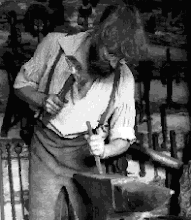One of the things I am getting requests for increasingly are custom blades as gifts on the male side of the modern wedding ritual *.
The commission was for a pair of roughly 4 inch blades, made of layered steel, with 'pale' wooden handles. The customer had sent me an image of a commercial blade shape he liked.
The blades are made of roughly 400 layer 'flat stack' layered up from mild, high carbon and L6 alloy steels. The handle material is maple.
 |
| The finished knives. |
 |
| Showing the distress pattern on the flat billet |
 |
| The blades as rough forged, after annealing. |
 |
| Polished, Hardened, Polished again - after Tempering (colours still showing). |
 |
| After a fast etch, just to get a glimpse of the surface patterning. |
The construction of the billet resulted in a flat stack at about 200 layers (three welding phases). This was drawn to a long bar, about 5 - 7 mm thick. The surface was distressed by using a pointed stone on my air die grinder. This produced a series of shallow rough tear drop cuts into the layered surface (on one side only). Each cut was about 2 cm long by 1 cm wide, about 3 mm deep.
At this point the bar was flattened again, cut and welded again with a high carbon steel core.
This has become my method when working with layered steel. This provides the hard cutting edge for a useful tool from the carbon core, but protected with the layered steel outer slabs. the layered steel is primarily a decorative effect in a blade in this size.
This final billet was drawn to the size needed to start forging the two matching blades.
Forge the actual blades. (total of 2 hours within the overall process).
Anneal.
One rough shaping polish, second surface polish.
Harden (Oil quench in this case), Heat soak (!!)
Fast cleaning polish, tempering.
I like to do my heat treating 'by eye' - to create a 'zone temper' result. You can see the resulting tempering colours, a blue along the back to a straw on the cutting edge.
Final surface polish
Etch (once in nitric for depth, again in ferric for colour)
Prepare, apply wood blocks, shape with files, sand smooth.
Total elapsed time for the two matching knives - 20 hours.
I would not have chosen this hilting material or shape. Left to my own artistic choice, I would have used a natural antler tube for these knives. This was entirely the customer's order however.
* What I have been finding is that there is a cultural shift happening - directly because of the impact of the overwealming growth of the commercial wedding industry, with its stress on the 'perfect fairytale' - and the massive costs involved. Watching their brides spending increadible amounts on, well, virtually everything, there is a increasing backlash of 'well, *I'm* getting something special too'.
One caution to those reading and dreaming :
See the total time?
What is 20 hours of your work time worth?
Guess how much this kind of specialist work
should command?
'Nuff Said?
















